France is like England, but without the hedgerows. Or like Belgium with bigger fields. Or like Germany, with fewer cows. Everything in the French countryside looks a bit over-the-hill, tired, knackered, and therefore quaint. There are opulent little houses incongruously perched on street corners, whose attractiveness seems designed to endure for nothing longer than the phase of the traffic light from which you behold it. There are few highlights in this part of northern France. Cambrai, Bapaume, Albert.

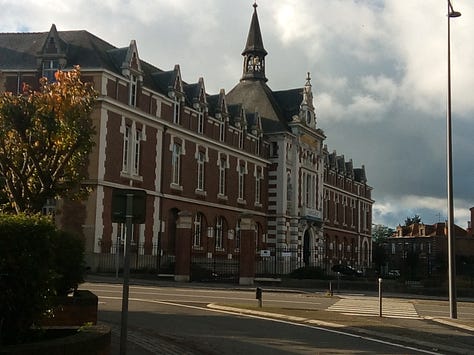
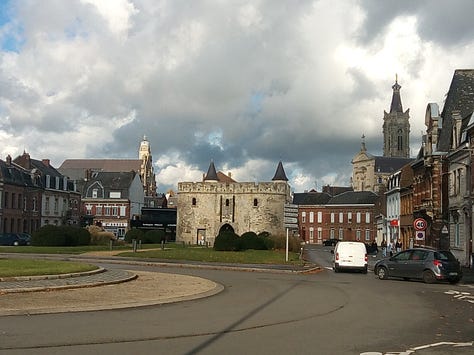
The first time I stayed with someone in rural Belgium, it was at a farmhouse near Ypres. The home of my penfriend, with whom I had corresponded in French, whilst she corresponded in English. I don’t know which of us learned the less of the other’s language, but our acquaintance has endured to this day. On a subsequent visit, after her marriage, which I attended, she was living in another house nearby on the main road, which had no bathroom. I found this unusual, until I realised that the house dated from the early 20s, and, in that time, there was no time for luxuries like bathrooms. Such was pretty much the fate that had befallen the towns of Cambrai, Bapaume and Albert. Cambrai still boasts some second empire architecture and even a mediaeval gate, no doubt painstakingly restored. I have also shown visitors to the mediaeval gothic town hall in Leuven and, in 1919, that too, had stood in all but ruins.
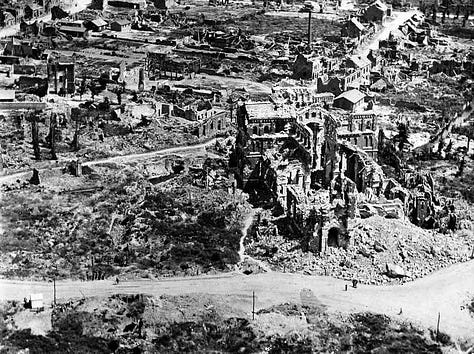
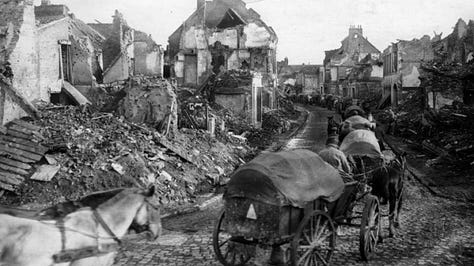
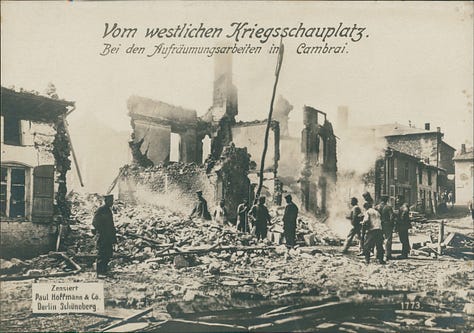
Rebuilding after a war, you don’t rebuild from scratch, even if scratch is where you start from. It’s not the scratch part that’s at issue; it’s the rebuild. Getting rebuilt is a gradual and painful process.
When I look around the countryside of the département de la Somme, I think it has been rebuilt now. It is green, and productive. The farms are charming and the tractors still hold you up like lumbering cattle down a country lane. The towns are what geographers call linear settlements, straight as a die with little to mark them out as special, besides their interminably long, and unpronounceable, names. The longest reserved for the hamlets, as if name length were diametrically disproportionate to “horse” numbers, as in one-horse town. Beaumetz-lès-Cambrai, Graincourt-lès-Havrincourt, Fontaine-Notre-Dame, and Escaudœuvres. Iwuy was especially charming, and I practised aloud for half an hour trying to figure out how it is pronounced locally. Ee-wee, I guess. Like kiwi, without the keuh.

I’d opted for my trip to Albert to eschew the billiard-table softness of France’s pay-motorways and instead took the departmental roads once the toll booths appeared on my horizon. It was worth it. The rural roads are slow going, but they’re as straight as deadbolts and, even as the driver, you can take the time to look around, since locals in a hurry have plenty of chance to pass you and there’s not that much traffic anyway. I moved over to allow a few by me, and they waved in grateful thanks at the courtesy. And I waved back, in courtesy for the privilege of visiting their homeland. Trooper 3300 Life Guards Henry Dixon fell at Albert on 17 September 1916, age 23. He didn’t come to the Somme intending to stay for all time. But for all time, he will remain here, tenderly cared for by the Graves Commission and tenderly respected by the people of France.
In Iwuy and in Cambrai, as I passed down the road in autumn sunshine so abundantly lavished upon us this day following the floodwaters of the eve, I saw civilian ceremonies ongoing, at war memorials and town halls; large crowds, too, and friendly policemen to marshal the passing traffic. Heart-warming. We remember our fallen troops but sometimes forget the fallen civilians, caught in the crossfire of warring armies. Just as in Ukraine. And just as in Gaza.
I’d previously blogged that my great-uncle fell in 1915. Not yet 25. Well 23 is not yet 25. And he lived until 1916, rather than perishing in 1915. Details. Really, details. I wonder how many Germans he killed. In the year between when I thought he’d died and the year he did die. How many letters he wrote home in that year. How much pain he felt and how much discomfort.
He was old. Twenty-three years old. Those who died around him were 21, 20, 19 even. Not yet men. Mort pour la patrie. Mort pour la folie.
The Germans erect memorials that they call Denkmäle: it means “just think a moment”. I like that. Because it’s very accurate: it’s what the most of us do—we think a moment, and then we go on our way. But the Germans have another word as well: Mahnmäle: “be warned for a moment.” Mahnmäle do not detain you for a moment. They should detain you for much longer than that. They should provoke a thought, this thought: that whatever led to the catastrophe for which this memorial was erected should never, ever occur again, and those who visit this Mahnmal should take that lesson with them in their hearts and strive to ensure these things are banished from the Earth. That, and nothing less, is a Mahnmal.
In English, we have no word for Mahnmal. So, instead of one word, we need to tell those who visit commemorations of the horrors of the past to strive to prevent repetition of those horrors. It’s ironic, but we really do need to tell people that.
And then it doesn’t matter when Trooper Henry Dixon fell from his horse dead, leaving a mourning family of ten brothers and sisters and two dirt-poor farmers in the wilds of Galloway to weep and to lament the loss of their handsome, wonderful young sibling. The year’s living that reality conferred on him that my own memory had deprived him ... I just hope it was worth the living. For nothing was worth his dying. When his brother was called up to serve in the Second World War, he professed conscientious objection and fought hard for his principles. If they saved Private Ryan, then they could save Private Dixon.
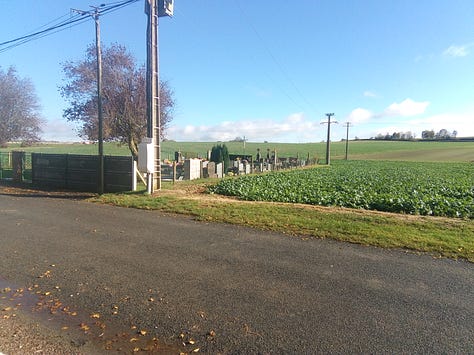


Trooper Dixon lies in Dartmoor. Not the real Dartmoor, but Dartmoor Cemetery. The road out of Albert has been realigned and the cemetery is now on a country byway, just outside the town. There are a few houses there. One has a large garden that is fenced off from the north wall of the cemetery. There must be a dip on the other side, for a dog in the garden was roused by my presence and barked over at me, and ran towards me so it could yap through the chain-link fence, but, as if it didn’t know, it could not reach the fence, so I guess there was a dip. If a dog doesn’t bark at the fence itself, I think it thinks the whole exercise pointless. And so this one did and soon left me in my peace, to contemplate the beauty of a spot that must have been a hell-hole at one time.
The D20 cuts off the town of Albert itself when you approach down the Cambrai road. About half a mile off the main road, you reach a three-way stop sign. These are non-existent in Belgium, but I know them from America. A British car had stopped and I realised he’d be confused by the fact I too had a stop sign, so I beckoned him to pass in front of me, as was his legal priority, and I followed him down the single-track road. Of occasion, we both pulled over to allow someone in the opposite direction to pass us. It was all so congenial. Presently my convoy companion pulled in to the side and I passed on down to Dartmoor.
I was alone. Utterly alone. There are so many of these cemeteries—I passed maybe a dozen on the Cambrai road alone—it’d be a miracle if they were all visited on Remembrance Day, but here, at least, was I. I’d brought my chrysanths and quickly found Trooper Dixon, there where I’d left him the last time I was here. I left him my pot of yellow flowers and it looked bonnie. As bonnie as Gallowa’ from where he’d come to northern France to die.
The British BMW caught me up and stopped down the road a little, and I greeted them. We chatted for a while. “I thought we’d passed one another and knew you were British: didn’t want to park too close to me.” They smiled and introduced themselves and we talked about the whole futility. Of this. Of our own times. “If only the men of power could come and see these tragic remains, remember them when they make their policy decisions,” the lady said. I agreed. H. Wright, she was here for. But she knew she’d not find him, for his grave, she knows, is unmarked. A Cambridgeshire man who’d been drafted at the start of the war into the Suffolks, in order to fill a regiment quickly. I left them to their own contemplations and saw them once again as they took a look at Norfolk Cemetery, on the road up to Bécourt. I honked, and they waved.
Honking and waving at an acquaintance is one of the very friendliest things anyone can do. It says nothing, and it says everything.




